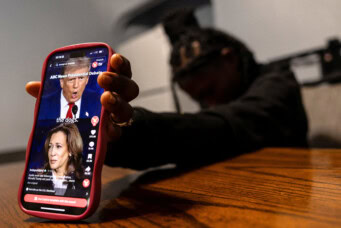American Netizens Worry For the Future of TikTok
The temporary banning of TikTok in the United States in January prompted concern over the politicization of tech platforms. The two likeliest paths forward for TikTok represent alternate visions of the relationship between Big Tech and government
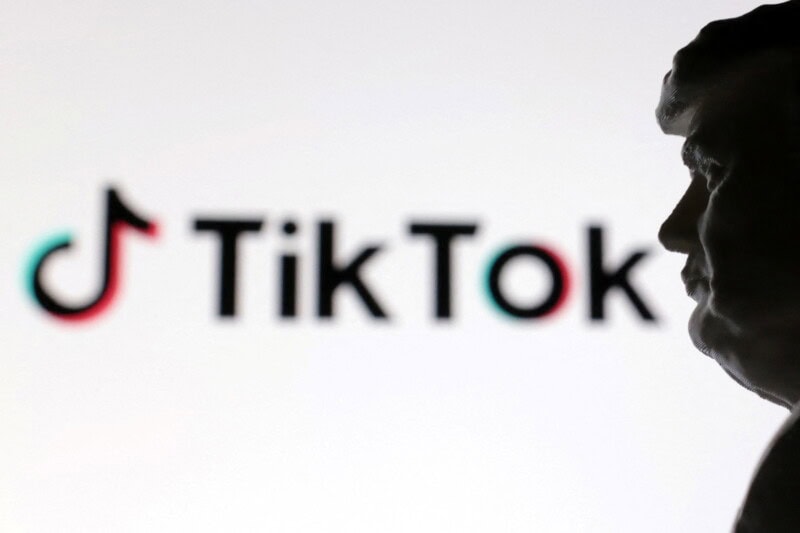
When I opened TikTok on the morning of January 19, I was met with a message I expected: “Sorry, TikTok isn’t available right now.” I was also met with one I didn’t: “We are fortunate that President Trump has indicated that he will work with us on a solution to reinstate TikTok once he takes office.”
The relationship between TikTok and the U.S. government has long been tumultuous. As TikTok’s presence in the
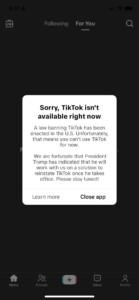
United States has grown, so have the concerns expressed by lawmakers about TikTok’s access to and use of American users’ data. It has also been shaped by the political tides: in July of 2020, a TikTok ban was first proposed by then-President Donald Trump as a means of retaliation against China for a perceived mishandling of the COVID-19 pandemic.
American social media users have prepared for an internet without the popular app for years. In 2020, Donald Trump issued an executive order in August 2020 requiring ByteDance, the Chinese company that operates TikTok, to sell its U.S. operations to a local buyer. In April of 2024, bipartisan legislation was passed setting a deadline of January 19, 2025, for the sale.
The ban turned out to be short-lived. Hours after it came into effect, TikTok’s U.S. operations were incrementally reinstated after then-President-Elect Trump posted on TruthSocial that he would pass an executive order affording ByteDance more time to sell its operations after his January 20 inauguration. On his first day in office on January 20, he made good on his promise by signing an executive order extending the sale deadline by 75 days.
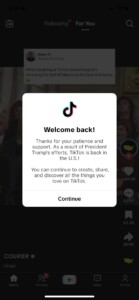
The debate over the app’s future is no coincidence: TikTok is one of the world’s largest social media platforms. Datareportal, a social media analysis firm, estimated in October 2024 that 1.69 billion people used TikTok worldwide. Though TikTok is the fifth-largest platform, users spend longer on it than any other application: on average 34 hours per month in August 2024. In America, that figure is higher: 42 hours.
TikTok isn’t only popular for scrolling—it’s also an engine for a massive creator economy. The United States also represents TikTok’s second largest advertising audience (users who self-identify as over 18), just behind Indonesia, at 138 million users. Almost 50 percent of all TikTok users say they use the app for brand research, and 22 percent follow influencers. Business Insider recently shared estimates from its sister company, Emarketer, indicating that U.S. ad revenue from TikTok generated a staggering $12.34 billion in 2024.
Given the extension of the sale deadline and new goodwill with Trump, it looks like creators can count on accessing TikTok through at least early April. Yet, during this period, Americans are questioning the role that TikTok will play in a second Trump administration. The most likely possibilities highlight a growing enmeshment between the White House and Silicon Valley that is perceived differently by the political Left and Right.
Scenario 1: Operations May Shift to one of Big Tech’s Major Players
Under the terms passed by Congress, TikTok’s U.S. operations will need to be purchased by an American company or individual in order for the app to remain operational within the United States. But, a partial purchase would also satisfy congressional requirements. “My initial thought is a joint venture between the current owners and/or new owners whereby the U.S. gets a 50% ownership in a joint venture set up between the U.S. and whichever purchase we so choose,” Trump wrote in his January 19 post on TruthSocial.
Several American celebrities have put their names forward as potential buyers. Kevin O’Leary, an investor who stars on the TV show Shark Tank (where he is called “Mr. Wonderful”), former Los Angeles Dodgers owner Frank McCourt, and internet celebrity Jimmy Donaldson (better known by his alias “Mr. Beast”) have all made comments expressing interest, Newsweek reports. Bloomberg reported on January 13 that the Chinese government was considering selling to X, SpaceX, and Tesla mogul Elon Musk, though a TikTok representative called the speculation “pure fiction” in comments to Variety days later.
However, some users are concerned that TikTok could be bought by what the Atlantic calls the “broligarchs”—male tech magnates that have become close with Trump. The Atlantic cites Musk and PayPal co-founder Peter Thiel, while Vox includes Meta’s Mark Zuckerberg and Amazon’s Jeff Bezos. All four are billionaires. Musk, Bezos, and Zuckerberg are also—in order—the first, second, and third richest people in America according to Forbes’ 2024 “400 list,” which identifies the country’s 400 wealthiest (Thiel, whose net worth is a paltry $9.2 billion to Musk’s $244 billion, is 116th).
Tech and money were—literally—front and center at Trump’s January 20 inauguration. Zuckerberg, Bezos, Musk, Google CEO Sundar Pichai, Apple CEO Tim Cook, and OpenAI CEO Sam Altman attended Trump’s January 20 inauguration, as did TikTok CEO Shou Zi Chew. All were seated prominently on the dais of the Capitol Rotunda, just next to where Trump himself was positioned. They sat closer to Trump than many of his Cabinet nominees, including now-confirmed Secretary of Defense Pete Hegseth and Secretary of Health and Human Services Robert F. Kennedy, Jr., or “RFK”.
It’s possible that one of these billionaires, who have both the money to purchase TikTok’s operations and experience running large social media organizations, may step in as a buyer. If they do, a new TikTok may align with the loose content moderation policies favored by the Trump administration and adopted by some extant platforms. In January, Meta announced that it would end fact-checking on its platforms by third-party fact-checkers, though users would be allowed to add context to posts. X and YouTube recently did the same. Meta and X have also rolled back measures restricting hate speech targeting the LGBT community.
It’s notable that Meta began its fact-checking program in 2016 after the company came under fire for misinformation on its platforms during Trump’s first election. Some users see the policy flip-flop as politically motivated: they point to Zuckerberg’s inauguration attendance, the $1 million donated by Meta, Amazon, Google, Microsoft, and OpenAI each to Trump’s inaugural fund, and the $277 million spent by Musk personally on Trump’s 2024 campaign. Others, however, feel that Meta’s former, stricter moderation rules were themselves a product of political pressure. In August, Zuckerberg told Congress that the Biden administration had pressured Meta to “censor certain COVID-19 content”.
If a sale is not made and TikTok goes dark for good, these platforms could also represent potential homes for former users. Even if a sale goes through, an outcome with which users aren’t happy, could also prompt platform migration.
The American tech ecosystem has already fashioned competitor products mirroring TikTok’s functionality. The biggest, Reels—which is available through Instagram and Facebook—stands to gain as a ready-made analog that most social media users already have on their phones.
Additionally, Meta products have proven attractive to TikTok users in particular: Datareportal indicates that 80.1 percent of TikTok users also use Instagram, and that 81.6 percent use Facebook. Facebook ads reach 71 percent of American adults, and Instagram ads 58 percent.
Emarketer knows this, and estimates that Meta could see an influx of between $2.46 and $3.38 billion in ad dollars following a TikTok ban. They indicate that other platforms, like YouTube and Snapchat, could also benefit. But, as of the time of writing, YouTube, Snapchat, and X lack products mirroring the function of TikTok in the way that Threads does.
Scenario 2: Users Might Switch to Smaller, “Protest” Platforms
Since the inauguration, some have expressed concern over the ties between Trump and some tech magnates. Trump has developed a particularly close relationship to Musk, who he announced in November would lead a new government agency called the Department of Government Efficiency (cheekily called “DOGE,” a reference to “dogecoin”: a joke-based cryptocurrency, or “memecoin”, that Musk has vocally supported).
Musk’s status within the government is ambiguous. He was appointed as an unpaid “special government employee”, a designation that allows for quick hiring for short-term appointments that NPR reports have often been used for private sector professionals. Special government employees do not require congressional confirmation, but do receive an ethics briefing and must disclose conflicts of interest. But, following inquiry from the press, a White House official said on February 25 that DOGE is formally run not by Musk but by former Health and Human Services official Amy Gleason.
What is clear is the significant influence exerted on Trump by Musk. Through DOGE, Musk has advised Trump with an eye to downsize the federal government, curtail federal spending, and dismantle regulation. This has included the dismantling of some agencies wholesale: the Trump administration put all employees of the U.S. Agency for International Development (USAID), which Musk once called “a criminal organization”, on administrative leave as of February 7 and took down its website.
Fourteen states lodged a lawsuit against both Trump and Musk on February 13, alleging that the power exerted by the latter is both undue and unconstitutional. “Although our constitutional system was designed to prevent the abuses of an 18th century monarch, the instruments of unchecked power are no less dangerous in the hands of a 21st century tech baron,” the lawsuit reads, as reported by ABC News.
Those concerned include some on the right. One user on the Trump-owned social media network TruthSocial, @ChristianAmericanPatriot, said in a reply to a conversation about Musk’s potential purchase of TikTok: “MAGA is about giving power and choice back to the We the People, not creating a monopoly for Elon or anyone else.”
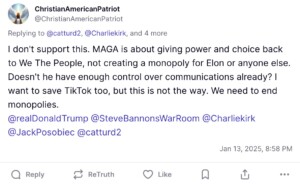
Tech has thus become political. Some see the prospect of a TikTok ban as blatantly partisan. “Since 2020, TikTok has served as a major hub for progressive speech and activism,” wrote Taylor Lorenz for User Mag on January 18. “The ban will deplatform thousands of progressive content creators and skew online discourse toward conservative ideologies.”
Indeed, Lorenz writes, citing Pew Research statistics, “TikTok is the only platform where left-leaning news influencers outnumber right-leaning ones:” Twenty-eight percent of Pew respondents who specialize in creating news-driven content on TikTok self-identified as left-leaning in September-October of 2024, outnumbering the 25 percent self-identifying as right-leaning.
Some users thus see the TikTok ban as a dangerous example of the censorship of a growing progressive movement. Others are frustrated with the dominance of progressive causes. “TikTok has almost made me conservative due to all the toxic leftist content,” posted Reddit user @ishutdoorzzzz on the r/AskALiberal subthread in October. In the post, the user explained that he felt targeted by content he encountered denigrating Black males, his identity as stated in his post.
TikTok has almost made me conservative due to all the toxic leftist content. How I do overcome this?
byu/ishutdoorzzzz inAskALiberal
But, the inverse is also true. “None of these are progressive views or representative of progressives,” posted user @SuperSpyChase in response. “I actually deleted tiktok because it essentially tried to radicalize me into White Nationalism,” said user @seanie_rocks: “I’m liberal af, but I’m into motorcycles, whiskey, metal, and guns. I was gradually fed more and more anti-mask, anti-vax, anti-immigrant, pro-Trump nonsense that I deleted the app years ago and haven’t missed it. It’s funny that for all the complaining about censorship that right-wingers do, there’s plenty of content being pushed out there for them on social media.”
Frustrated, some TikTok users shifted to Chinese platforms during and before the January blackout. Reuters, using Similarweb data, reports that the app RedNote gained almost 3 million users in one day in the week preceding January 19. They say that Lemon8, which is also owned by Bytedance, gained 600,000 U.S. users ahead of the ban.
Most American users shifted back to TikTok once it came back online (partially due to the restoration of access and partially due to experiences with censorship). But, the migration underscores a popular animus toward the prospect of a banned TikTok.
It’s possible that a homegrown alternative will be created. Within the past five years, several applications mirroring popular platforms have sprung up in direct opposition to leadership decisions perceived as political. In 2022, for instance, TruthSocial was developed as a haven for users frustrated with then-Twitter’s moderation policies after Trump was banned from the platform. More recently, Bluesky has welcomed progressive users disaffected by a new lack of content moderation on X and Meta.
Public interest foundation “Free Our Feeds” says it seeks to “billionaire-proof” social media by creating “an open and healthy social media ecosystem that cannot be controlled by any single company or billionaire”.
It aims to do this by leveraging the Authenticated Transfer, or AT, Protocol: technology which is also used by Bluesky. In a blog post published during Bluesky’s development, Bluesky described the AT Protocol as a federated network, meaning that users can choose to host their profiles through various data servers, including their own. In layman’s terms: the AT Protocol disaggregates user data from one corporate owner and affords users the opportunity for self-ownership. “A person’s online identity should not be owned by corporations with no accountability to their users,” the blog post reads.
Despite using Bluesky-developed tech, Free Our Feeds describes itself as independent. An open letter launching the initiative says of Bluesky: “they remain a commercial company, and despite their best intentions they will come under the same pressures all businesses face: to maximise return to their investors.”
Free Our Feeds is run by a team of nine tech professionals. Two hail from the Mozilla Foundation, and another two from New_Public. The open letter was signed by sixty supporters, including journalists, actors, academics, and entrepreneurs. Notably, they include Mark Ruffalo (“Hulk Democratize,” I suppose), the founder of Wikipedia, and politicians currently and formerly associated with the UK House of Lords, the European Parliament, and the Taiwanese Ministry of Digital Affairs.
Despite its star-studded scroll of supporters, Free Our Feeds will be grassroots-funded. To get up and running, it’s sourcing $4 million USD in individual contributions through GoFundMe.

